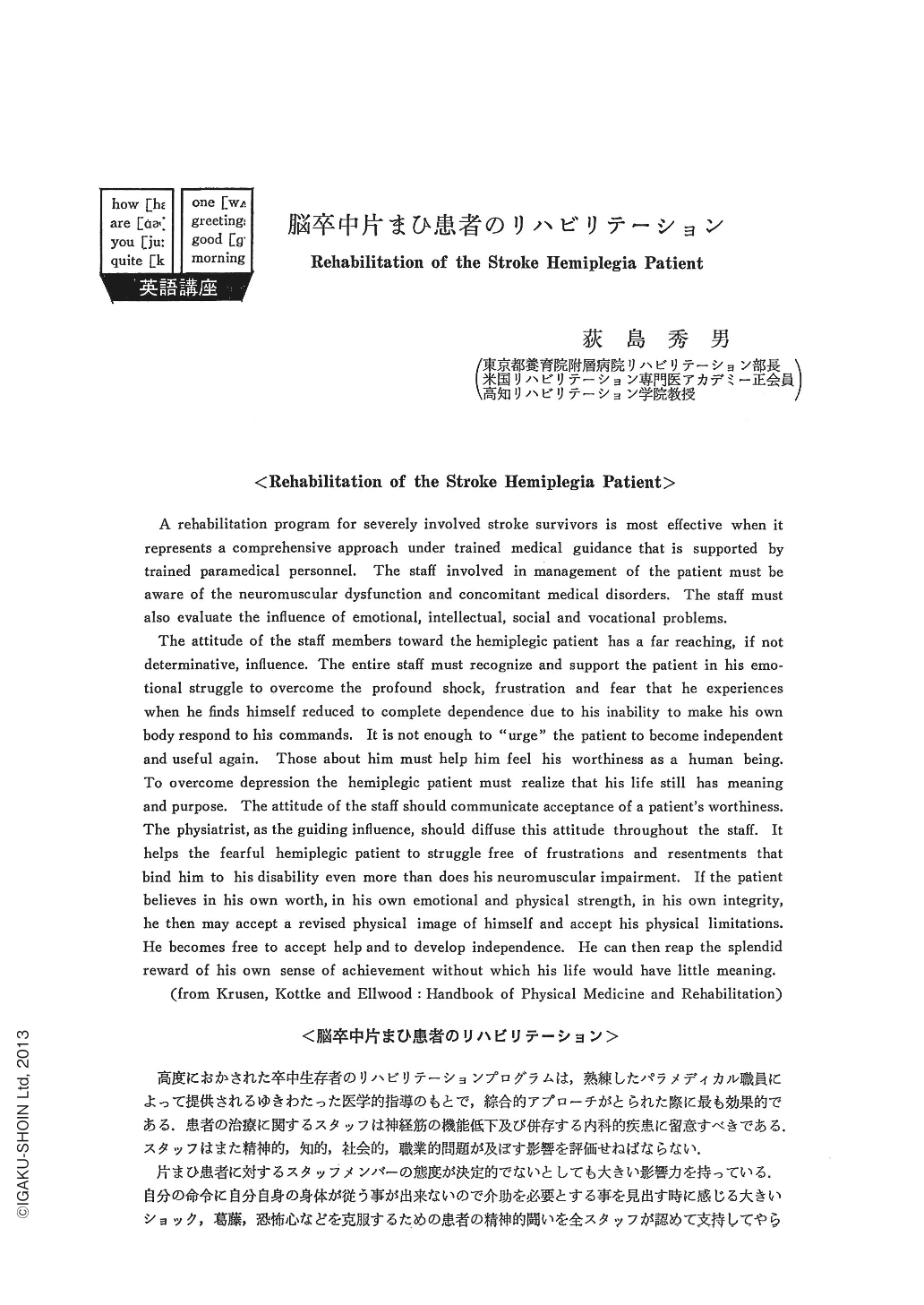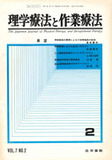Japanese
English
- 有料閲覧
- Abstract 文献概要
- 1ページ目 Look Inside
高度におかされた卒中生存者のリハビリテーションプログラムは,熟練したパラメディカル職員によって提供されるゆきわたった医学的指導のもとで,綜合的アプローチがとられた際に最も効果的である.患者の治療に関するスタッフは神経筋の機能低下及び併存する内科的疾患に留意すべきである.スタッフはまた精神的,知的,社会的,職業的問題が及ぼす影響を評価せねばならない.
片まひ患者に対するスタッフメンバーの態度が決定的でないとしても大きい影響力を持っている.自分の命令に自分自身の身体が従う事が出来ないので介助を必要とする事を見出す時に感じる大きいショック,葛藤,恐怖心などを克服するための患者の精神的闘いを全スタッフが認めて支持してやらなければならない.自立して機能を復活するように患者を促すだけでは不十分である.患者をとりまく人々は人間としての価値を患者に感じさせるように助けなくてはならない.デプレッションを克服するために片まひ患者は彼の人生にまだ意義があり目的があることを認識しなければならない.スタッフの態度は患者の存在価値を受け入れていることを伝えなくてはならない.指導的な影響力でリハビリテーション医はこの態度をスタッフ全員に浸透させなくてはならない.それによって筋神経障害そのものよりも障害になる葛藤やうらみと闘わないように恐怖心を持った片まひ患者を助ける事になる.もし患者が自分の価値,感情及び身体的な力を自分なりに信じれば彼自身の身体イメージ変化及び機能障害を受け入れるかもしれない.助けをこばまないようになり独立性を増す,それで患者は自分が達成した事に関しての素晴らしい報酬を感じ,その努力なしには人生はあまり意義がないという事を受け入れる.
A rehabilitation program for severely involved stroke survivors is most effective when it represents a comprehensive approach under trained medical guidance that is supported by trained paramedical personnel. The staff involved in management of the patient must be aware of the neuromuscular dysfunction and concomitant medical disorders. The staff must also evaluate the influence of emotional, intellectual, social and vocational problems.
The attitude of the staff members toward the hemiplegic patient has a far reaching, if not determinative, influence. The entire staff must recognize and support the patient in his emotional struggle to overcome the profound shock, frustration and fear that he experiences when he finds himself reduced to comlete dependence due to his inability to make his own body respond to his commands. It is not enough to "urge" the patient to become independent and useful again. Those about him must help him feel his worthiness as a human being. To overcome depression the hemiplegic patient must realize that his life still has meaning and purpose. The attitude of the staff should communicate acceptance of a patient's worthiness. The physiatrist, as the guiding influence, should diffuse this attitude throughout the staff. It helps the fearful hemiplegic patient to struggle free of frustrations and resentments that bind him to his disability even more than does his neuromuscular impairment. If the patient believes in his own worth, in his own emotional and physical strength, in his own integrity, he then may accept a revised physical image of himself and accept his physical limitations. He becomes free to accept help and to develop independence. He can then reap the splendid reward of his own sense of achievement without which his life would have little meaning.
(from Krusen, Kottke and Ellwood:Handbook of Physical Medicine and Rehabilitation)

Copyright © 1973, Igaku-Shoin Ltd. All rights reserved.


